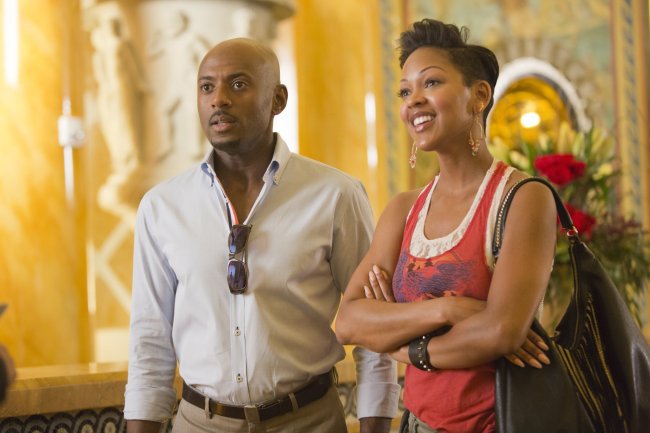Meagan Good stopped having sex, and all of a sudden it was all anyone wanted to talk about with her. “People are fascinated by it!” she said, adding she doesn’t mind talking about her sex life (or lack thereof).
Good and her “Think Like a Man Too” co-star Michael Ealy were in town last week to talk about the movie, the sequel to the surprise 2012 blockbuster “Think Like a Man,” based on Steve Harvey’s book, Act Like a Lady, Think Like a Man. “Too” follows the group of friends navigating relationship follies as they continue their stories, past the meet-cute stage, on a Vegas vacation.
The flick hits theaters Friday.
During the first movie, Good’s character, Mya, who was dating former playboy Zeke (Romany Malco), was taking part in the 90-day rule, which essentially translated to no hanky-panky for the first three months of a relationship. “While I was playing Mya, who was implementing the 90-day rule, I was living Meagan who was living the 90-day rule and then some,” Good said about her impromptu method acting. “It was like, ‘Girl, I get it.’”
She and her pastor-cum-movie-exec husband, DeVon Franklin, had decided to abstain before their 2012 nuptials. It worked so well, they’re literally writing the book on keeping things PG before marriage. Good and Franklin are calling their book “The Wait.”
 |
Zeke (Romany Malco, left) and Mya (Meagan Good) in Screen Gems’ “Think Like a Man Too.” (Matt Kennedy/Courtesy Screen Gems/MCT) |
But just because they waited doesn’t mean Good thinks everyone should. “I wouldn’t preach to other people. It’s just offering another option,” she said.
“It’s not about telling people to wait but just talking about what it was like to wait. You can liken that to anything. It can be a relationship, a career or just waiting on God in any way, shape or form to show up for you.
“In that time, you grow, you mature, you learn about yourself. There are so many reasons to be present in the wait so you’re not focused on getting what you want immediately.”
For Ealy, Good’s ethos ties into the theme of the movie. “You have to define happiness for yourself,” he said. “Sometimes that’s being with the one you love instead of jumping into a situation you’ve always dreamed of.”
He was referring to his character, Dominic, who might have to separate from girlfriend Lauren (Taraji P. Henson) because both have new opportunities. Ealy noted that he liked that Lauren makes this decision on her own, not based on the demands of her man.
But he bristled at the idea that “Think Like a Man Too” is in any way more progressive than the original’s source material, which was criticized for what some called an outdated view of how women should act in a relationship. Ealy said that Harvey’s perspective boiled down to a simple idea: If you respect yourself, he will respect you.
“Think Like a Man Too” expands on the ideas of the first movie, in that it looks at what Ealy called “phase two” of any relationship. Once the honeymoon is over, that’s when real life starts.
“People want to see a reflection of their own lives,” Good said. “Hopefully we get to do a part three. What happens next?”
Ealy went through his own struggle with long-distance love last year when he started filming his now-canceled Fox show “Almost Human” in Vancouver.
Would he bring his family ― son Elijah and wife Khatira ― with him, or commute home on weekends? (He chose the former, he said, because he wanted to be a present parent for his young son.)
Going hand-in-hand with seeing real-life issues on screen, Ealy stressed that it’s also important for all types of people to see reflections of themselves up in lights.
A spate of movies with predominantly black casts have been deemed “surprise hits” at the box office of late ― the original “Think Like a Man” ($91.5 million box office), “Best Man Holiday” ($70.5 million) and “Ride Along” ($134.2 million) ― to name a few.
Ealy, who also starred in “About Last Night” ($48.6 million), admitted he feels a certain amount of pressure as a black actor; that if one movie featuring an African-American cast doesn’t do well, no more will be made.
“Everybody who does a film ― it doesn’t matter whether you’re black, white, Asian, whatever ― they want it to do well. I would be lying if I said there wasn’t any pressure, though,” Ealy said. ”You don’t want these movies to not be made. Having seen the reaction to ‘Think Like a Man,’ I would hate it if they stopped making these movies. There’s a demand for them. There’s a pressure to not lose that for the audience, more so than yourself.”
By Molly Eichel
(Philadelphia Daily News)
(MCT Information Services)








